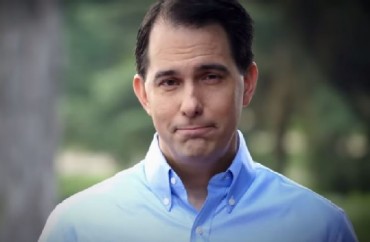
We missed something in our recent report on the higher-education proposals in Republican Gov. Scott Walker’s budget for Wisconsin: It would also codify the state’s commitment to free speech on public college campuses.
As flagged by Joe Cohn, legislative and policy director for the Foundation for Individual Rights in Education, the nearly 1,000-page bill introduced in the Assembly features this section on page 372:
Freedom of expression. (1) The board and each institution and college campus shall be committed to free and open inquiry in all matters and shall guarantee all members of the system’s community the broadest possible latitude to speak, write, listen, challenge, and learn. Except to the extent limitations on that freedom are necessary to the functioning of the system, the board and each institution and college campus shall fully respect and support the freedom of all members of the system’s community to discuss any problem that presents itself.
(2) In the face of conflicting ideas, it is not the proper role of the board or any institution or college campus to attempt to shield individuals from ideas and opinions they find unwelcome, disagreeable, or even deeply offensive. Although the board and each institution and college campus shall greatly value civility, and although all members of the system’s community share in the responsibility for maintaining a climate of mutual respect, concerns about civility and mutual respect can never be used as a justification for closing off discussion of ideas, however offensive or disagreeable those ideas may be to some members of the system’s community.
MORE: Walker’s budget makes it optional for students to fund liberal programs
Paragraph 3 lists exceptions, but continues:
However, these exceptions to the general principle of freedom of expression shall be construed narrowly and are not intended to be used in a manner that is inconsistent with the system’s commitment to a completely free and open discussion of ideas. The system’s fundamental commitment is to the principle that debate or deliberation may not be suppressed because the ideas put forth are thought by some or even by most members of the system’s community to be offensive, unwise, immoral, or wrongheaded. It is for the individual members of the system’s community, not for the board or any institution or college campus, to make those judgments for themselves, and to act on those judgments not by seeking to suppress speech, but by openly and vigorously contesting the ideas that they oppose.
And paragraph 4 makes clear that members of public colleges “may not obstruct or otherwise interfere with the freedom of others to express views they reject or even loathe”:
To this end, the board and each institution and college campus has a responsibility not only to promote a lively and fearless freedom of debate and deliberation, but also to protect that freedom when others attempt to restrict it.
Cohn says this language largely tracks the University of Chicago’s pioneering 2015 statement on free speech and that something “substantially similar” already governs University of Wisconsin System institutions under Board of Regents policy.
MORE: University of Chicago releases sweeping free-speech statement
What’s new is that Walker’s proposed language would codify this policy so that it’s not subject to reversal by the regents, and would extend it to community colleges and other public institutions:
And finally, inserting free speech principles into the gubernatorial budget sends a clear signal to students and institutions alike that free expression on campus is an important value that the state government wants protected.
A spokesman for the UW-Madison student government feared that the language might be interpreted to force public institutions to “censor students” and violate their freedom of assembly, and the head of the school’s American Association of University Professors chapter wonders if protest speech will be protected, The Capital Times reports.
Cohn pooh-poohed these claims:
FIRE is satisfied that if this language is implemented faithfully, people will remain free to peacefully protest or criticize speakers or ideas they disagree with or find offensive. Only conduct that prevents others from exercising their free speech rights would be prohibited.
Read the bill (again, page 372), Cohn’s post and Times report.
MORE: Wisconsin professor apologizes for comparing Scott Walker to Hitler
Like The College Fix on Facebook / Follow us on Twitter
IMAGE: YouTube




Please join the conversation about our stories on Facebook, Twitter, Instagram, Reddit, MeWe, Rumble, Gab, Minds and Gettr.